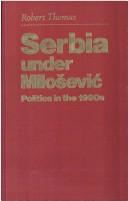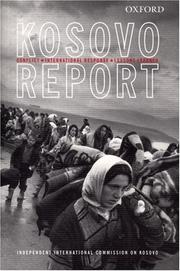| Listing 1 - 10 of 13 | << page >> |
Sort by
|
Book
Year: 2000 Publisher: Paris : Institute for Security Studies of Western European Union,
Abstract | Keywords | Export | Availability | Bookmark
 Loading...
Loading...Choose an application
- Reference Manager
- EndNote
- RefWorks (Direct export to RefWorks)

ISBN: 1850653674 Year: 1999 Publisher: London : Hurst,
Abstract | Keywords | Export | Availability | Bookmark
 Loading...
Loading...Choose an application
- Reference Manager
- EndNote
- RefWorks (Direct export to RefWorks)
Book
ISBN: 8672080572 Year: 2002 Publisher: Belgrade : Helsinki Committee for Human Rights in Serbia,
Abstract | Keywords | Export | Availability | Bookmark
 Loading...
Loading...Choose an application
- Reference Manager
- EndNote
- RefWorks (Direct export to RefWorks)
HUMAN RIGHTS--SERBIA --- SERBIA--POLITICS AND GOVERNMENT --- SERBIA--ECONOMIC POLICY
Book
ISBN: 0907967663 Year: 1996 Publisher: London : Alliance,
Abstract | Keywords | Export | Availability | Bookmark
 Loading...
Loading...Choose an application
- Reference Manager
- EndNote
- RefWorks (Direct export to RefWorks)

ISBN: 0747561818 Year: 2003 Publisher: London : Bloomsbury,
Abstract | Keywords | Export | Availability | Bookmark
 Loading...
Loading...Choose an application
- Reference Manager
- EndNote
- RefWorks (Direct export to RefWorks)

ISBN: 2213607478 Year: 2000 Publisher: Paris Fayard
Abstract | Keywords | Export | Availability | Bookmark
 Loading...
Loading...Choose an application
- Reference Manager
- EndNote
- RefWorks (Direct export to RefWorks)
MILOSEVIC, SLOBODAN, 1941-2006--BIOGRAPHY --- YUGOSLAVIA--POLITICS AND GOVERNMENT --- YUGOSLAV WAR, 1991-1995 --- KOSOVO WAR, 1998-1999 --- PRESIDENTS--YUGOSLAVIA--BIOGRAPHY --- SERBIA--POLITICS AND GOVERNMENT --- PRESIDENTS--SERBIA--BIOGRAPHY --- Milosevic, Slobodan --- Statesmen --- Yugoslavia --- Serbia --- Biography --- Presidents --- Politics and government --- 1945 --- -Milosevic, Slobodan
Book
ISSN: 10177566 ISBN: 9291980773 9789291980772 Year: 2005 Volume: 81 Publisher: Paris: European Union. Institute for Security Studies,
Abstract | Keywords | Export | Availability | Bookmark
 Loading...
Loading...Choose an application
- Reference Manager
- EndNote
- RefWorks (Direct export to RefWorks)
Five years after the fall of Slobodan Milosevic, it is still not clear where Serbia is heading. Indeed, it is not yet clear what, or even where Serbia is. Serbia’s borders and statehood remain open questions: the future status of Kosovo is unresolved and the survival of the State Union with Montenegro in doubt. As long as Serbia does not know what and where it is, its progress towards EU integration will be impeded. The political agenda remains heavily burdened by these open questions, and the baneful legacies of Milosevic’s misrule. These divert politicians’ attention from the equally demanding challenges of preparing for EU integration. Serbia needs to redefine its national identity and statehood in order to become capable of integrating into the EU. Serbia matters. With a population of 7.5 million, it is by far the largest country in the Western Balkans, and, as such, of crucial importance for the stability of the whole region. While the Serbs want to ‘join Europe’, they still do not fully trust it, and the feeling is reciprocated. Both sides now need to work to overcome their mutual incomprehension. This Chaillot Paper aims to make a start on that.
Nationalism --- Nationalisme --- Serbia --- Kosovo (Republic) --- Serbie --- Kosovo --- Politics and government --- Politique et gouvernement --- Globalization --- Social conditions --- Foreign relations --- Globalization - Serbia --- Serbia - Politics and government --- Serbia - Social conditions --- Serbia - Foreign relations
Book
ISBN: 9783030221485 3030221482 3030221490 Year: 2019 Publisher: Basingstoke: Palgrave MacMillan,
Abstract | Keywords | Export | Availability | Bookmark
 Loading...
Loading...Choose an application
- Reference Manager
- EndNote
- RefWorks (Direct export to RefWorks)
This book explores the stagnation of democracy in the Western Balkans over the last decade. The author maps regional features of rising authoritarianism that mirror larger global trends and, in doing so, outlines the core mechanisms of authoritarian rule in the Balkans, with a particular focus on Serbia, Montenegro and Macedonia. These mechanisms include the creation of constant crises, the use of external powers to balance outside influences, as well as state capture. The authoritarian patterns exist alongside formal democratic institutions, resulting in competitive authoritarian regimes that use social polarization to retain power. As the countries of the Western Balkans aspire, at least formally, to join the European Union, authoritarianism is often informal. Florian Bieber is Professor for Southeast European History and Politics and Director of the Centre for Southeast European Studies at the University of Graz, Austria. He coordinates the Balkans in Europe Policy Advisory Group (BiEPAG) and has been a visiting professor and fellow at Cornell, NYU, Central European University, and LSE.
Authoritarianism --- Serbia --- Montenegro --- Macedonia (Republic) --- Politics and government --- AUTHORITARIANISM--SERBIA --- AUTHORITARIANISM--MONTENEGRO --- AUTHORITARIANISM--NORTH MACEDONIA --- SERBIA--POLITICS AND GOVERNMENT --- MONTENEGRO--POLITICS AND GOVERNMENT --- NORTH MACEDONIA--POLITICS AND GOVERNMENT --- Authoritarianism - Serbia --- Authoritarianism - Montenegro --- Authoritarianism - Macedonia (Republic) --- Serbia - Politics and government - 2006 --- -Montenegro - Politics and government - 1992 --- -Macedonia (Republic) - Politics and government - 1992 --- -Authoritarianism --- Europe—Politics and government. --- Democracy. --- World politics. --- Political science. --- Regionalism. --- Political leadership. --- European Politics. --- Political History. --- Governance and Government. --- Political Leadership. --- Europe --- Politics and government.

ISBN: 0271019581 0271019573 9780271019581 9780271019574 Year: 1999 Publisher: University Park, Pa.: Pennsylvania state university press,
Abstract | Keywords | Export | Availability | Bookmark
 Loading...
Loading...Choose an application
- Reference Manager
- EndNote
- RefWorks (Direct export to RefWorks)
Nationalism --- Totalitarianism --- History --- TotalitarianismHistory --- Serbia --- Social life and customs --- Politics and government --- Nationalism - Serbia and Montenegro - Serbia - History - 20th century --- Totalitarianism - Serbia and Montenegro - Serbia - History - 20th century --- Serbia - Social life and customs - 20th century --- Serbia - Politics and government - 1945-1992

ISBN: 0199243093 9780199243099 Year: 2000 Publisher: Oxford : Oxford university press,
Abstract | Keywords | Export | Availability | Bookmark
 Loading...
Loading...Choose an application
- Reference Manager
- EndNote
- RefWorks (Direct export to RefWorks)
The war in Kosovo was a turning point: NATO deployed its armed forces in war for the first time, and placed the controversial doctrine of 'humanitarian intervention' squarely in the world's eye. It was an armed intervention for the purpose of implementing Security Council resolutions-but without Security Council authorization.This report tries to answer a number of burning questions, such as why the international community was unable to act earlier and prevent the escalation of the conflict, as well as focusing on the capacity of the United Nations to act as global peacekeeper.The Commission recommends a new status for Kosovo, 'conditional independence', with the goal of lasting peace and security for Kosovo-and for the Balkan region in general. But many of the conslusions may be beneficially applied to conflicts the world-over.
Intervention (International law) --- #SBIB:013.AANKOOP --- #SBIB:327.5H21 --- #SBIB:327.6H40 --- #SBIB:328H271 --- Military intervention --- Diplomacy --- International law --- Neutrality --- Vrede – oorlog, oorlogssituaties --- Internationale en diplomatieke relaties: periode na de Koude Oorlog / Val van de Muur --- Instellingen en beleid: Balkanstaten: Roemenië, Bulgarije, Ex-Joegoslavië, Albanië e.a. --- Kosovo (Serbia) --- -Kosovo (Serbia) --- -Politics and government --- History --- -Intervention (International law) --- Kosovo War, 1998-1999. --- NeutralityVrede – oorlog, oorlogssituaties --- Instellingen en beleid: Balkanstaten: Roemenië, Bulgarije, Ex-Joegoslavië, Albanië e.a.Kosovo (Serbia) --- -Kosovo (Serbia) -Politics and government --- -Intervention (International law). --- Intervention (International law). --- Kosovo War, 1998-1999 --- Kosovo Conflict, 1998-1999 --- Kosovo Crisis, 1998-1999 --- Instellingen en beleid: Balkanstaten: Roemenië, Bulgarije, Ex-Joegoslavië, Albanië e.a --- Kosovo (Republic) --- Politics and government. --- Kosovo (Republic) - Politics and government
| Listing 1 - 10 of 13 | << page >> |
Sort by
|

 Search
Search Feedback
Feedback About UniCat
About UniCat  Help
Help News
News